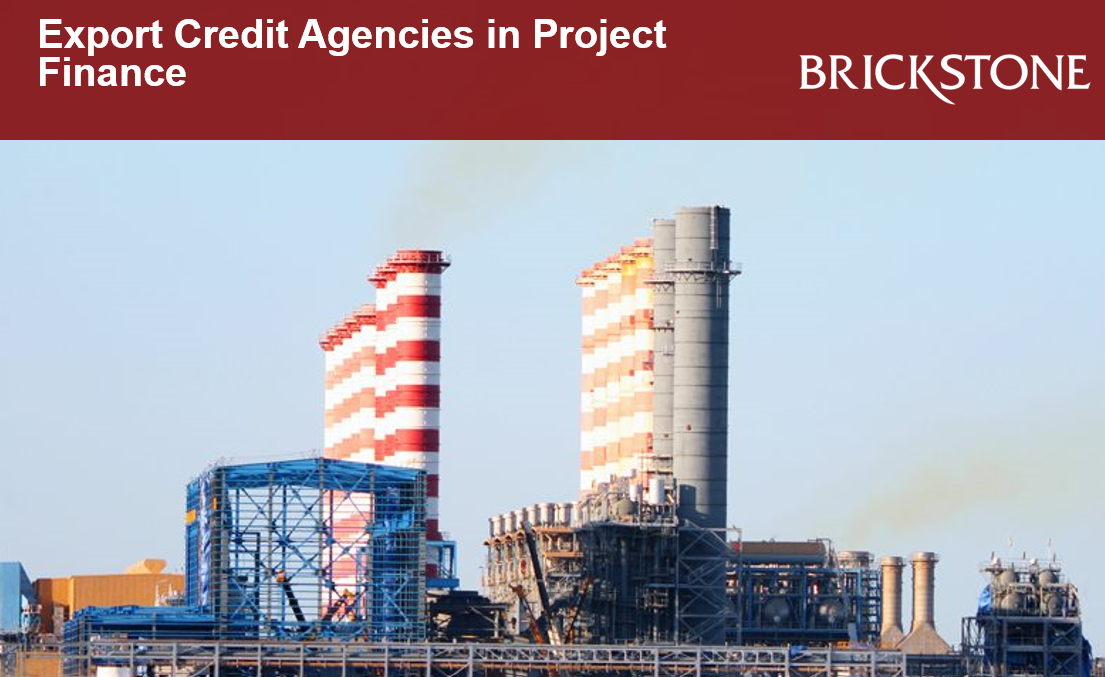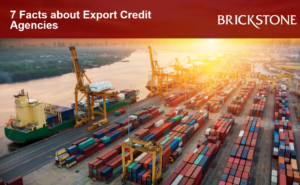Role of Export Credit Agencies in Project Financing
Export credit agencies were previously a lender of last resort, stepping in only when private-sector financing was unavailable. However, they’ve taken on a greater role since the 2008 Global Financial Crisis as banks became more risk-averse, leaving many companies looking for a new alternative to support their exports in riskier or more volatile markets. According to the Corporate Finance Institute, their respective services were offered to minimize the risk of participating in international markets and decrease the barriers to entry for domestic businesses.
Now as the largest source of public support for the financing of infrastructure projects in developing countries, export credit agencies play a key role in facilitating global capital flows. On behalf of national governments, they offer insurance, guarantees or credit to domestic companies to cover their financial risks of doing business abroad.
This article by Brickstone reviews some institutional reports and publications on the role of Export Credit Agencies in project financing, highlighting key facts and insights.
Export Credit Agencies in Project Financing
According to LexisNexis, projects are typically financed on a limited recourse basis through one or more sources, including: government contributions, senior debt provided by commercial lenders and/or funds, and equity provided by project sponsors. However, in certain jurisdictions, senior debt provided by commercial lenders and/or funds may be difficult to obtain due to the limitations on local liquidity and/or actual or perceived local political risks.
This funding gap in developing markets may be bridged by funding provided by institutional lenders, such as Export Credit Agencies (ECAs) and multilateral or bilateral (national) Development Finance Institutions (DFIs). Alternatively, lenders providing senior debt may be supported by an ECA or DFI by means of a guarantee or other form of insurance cover.
Typically, Export Credit Agencies (ECAs) are involved in projects abroad to promote their national industries in the context of international trade, for example, where a national industry owns equity in a foreign project or is a key project contractor or when it supplies project equipment to such a project
According to WWL, many export credit agencies in the mid-1990s provided coverage for the financing of power projects in different parts of the world, some of these being Pagbilao and Sual in the Philippines, Shandong in China, San Pedro in the Dominican Republic and Manah Power Project in Oman. There was also considerable involvement in India for several years with fast track Power Projects such as Dabhol, Vizag Magalore and Bhadravati, where the ECAs relied on a guarantee from the government of India, but these other than Dabhol were never completed because of structural issues.
In recent years there has been a switch from power projects to large oil, gas and pipeline projects, for example Qatargas, Ras Laffan, Oman LNG, Nigeria LNG and BTC Pipeline. There is also considerable involvement by ECAs in the telecoms market, and in the ECGD’s case particularly with the Philippines, India and Kazakhstan.
In a typical power station financing, it would be normal for the project sponsors to establish the basic project documentation before the export credit agencies and lenders became involved. The sponsors would have to negotiate with the appropriate authorities any concession or authorisation agreement, including the terms of any power purchase agreement; and any additional state support before deciding to seek outside tenders for the supply of turbines and other power station equipment.
As a result, key documents such as the power purchase agreement or energy conversion agreement could well have reached the final stage even before lenders became involved. Likewise, in an oil and gas project, the sponsors may well have negotiated the production-sharing agreement or a development fiscal agreement with the authorities long before the lenders were on board.
With a typical pipeline project passing through many countries, an intergovernmental treaty between the countries concerned may be required, and then individual host government agreements with the different countries to deal with local law issues such as the licensing regime, stabilisation clauses and rights of enforcement. Setting up such a complicated project structure means that the documentation may well have been agreed up front so that when the ECAs become involved – to protect their position – they must rely on negotiating particular terms into the direct agreements and assignment of the relevant project documentation to the lenders as part of their security package.
In the past, commercial lenders were often initially involved in negotiating a draft term sheet with the sponsors and because they were concerned about winning the mandate for the financing would often make concessions in the full knowledge that when the export credit agencies and multilaterals became involved they would rely on them to reinstate relevant provisions of the term sheet that were particularly applicable and of concern to the export credit agencies.
Read more here.






